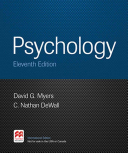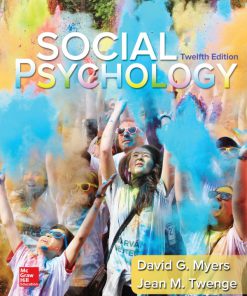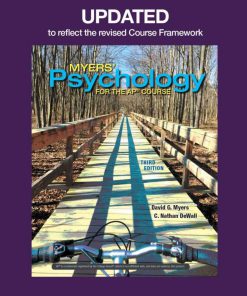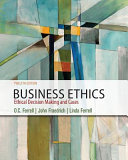Psychology 12th Edition by C Nathan Dewall, David G Myers ISBN 131905062X 9781319050627
$50.00 Original price was: $50.00.$25.00Current price is: $25.00.
Psychology 12th Edition by C Nathan Dewall, David G Myers – Ebook PDF Instant Download/Delivery: 131905062X ,9781319050627
Full download Psychology 12th Edition after payment

Product details:
ISBN 10: 131905062X
ISBN 13: 9781319050627
Author: C Nathan Dewall, David G Myers
Psychology 12th Edition Table of contents:
Chapter 1 – Thinking Critically With Psychological Science
-
The Need for Psychological Science
-
The Scientific Method
-
Thinking Critically About: Correlation and Causation
-
Psychology’s Research Ethics
-
Statistical Reasoning in Everyday Life
-
Describing Data
-
Significant Differences
Chapter 2 – The Biology of Mind
-
Biology, Behavior, and Mind
-
The Power of Plasticity
-
Neural Communication
-
The Nervous System
-
The Endocrine System
-
The Tools of Discovery: Having Our Head Examined
-
Older Brain Structures
-
The Limbic System
-
The Cerebral Cortex
-
Structure of the Cortex
-
Functions of the Cortex
-
Thinking Critically About: Using More Than 10 Percent of Our Brain
-
Responses to Damage
-
The Divided Brain
Chapter 3 – Consciousness and the Two-Track Mind
-
Defining Consciousness
-
Studying Consciousness
-
Selective Attention
-
Dual Processing: The Two-Track Mind
-
Sleep and Dreams
-
Biological Rhythms and Sleep
-
Why Do We Sleep?
-
Sleep Deprivation and Sleep Disorders
-
Dreams
-
Tolerance and Addiction in Substance Use Disorders
-
Types of Psychoactive Drugs
-
Influences on Drug Use
Chapter 4 – Nature, Nurture, and Human Diversity
-
Behavior Genetics: Predicting Individual Differences
-
Genes: Our Codes for Life
-
Twin and Adoption Studies
-
Temperament and Heredity
-
Heritability
-
Gene–Environment Interaction
-
Evolutionary Psychology: Understanding Human Nature
-
Natural Selection and Adaptation
-
Evolutionary Success Helps Explain Similarities
-
An Evolutionary Explanation of Human Sexuality
-
How Does Experience Influence Development?
-
Cultural Influences
-
Gender Development
-
Thinking Critically About: Gender Bias in the Workplace
-
Reflections on Nature, Nurture, and Their Interaction
Chapter 5 – Developing Through the Life Span
-
Developmental Psychology’s Major Issues
-
Prenatal Development and the Newborn
-
Physical Development
-
Cognitive Development
-
Social Development
-
Thinking Critically About: Parenting Styles
-
Adolescence
-
Physical Development
-
Cognitive Development
-
Social Development
-
-
Emerging Adulthood
-
Physical Development
-
Cognitive Development
-
Social Development
-
Chapter 6 – Sensation and Perception
-
Processing Sensation and Perception
-
Transduction
-
Thresholds
-
Thinking Critically About: Subliminal Sensation and Subliminal Persuasion
-
Sensory Adaptation
-
Perceptual Set
-
Context, Motivation, and Emotion
-
Light Energy and Eye Structures
-
Information Processing in the Eye and Brain
-
Perceptual Organization
-
Perceptual Interpretation
-
Hearing
-
The Other Senses
-
Sensory Interaction
-
ESP—Perception Without Sensation?
Chapter 7 – Learning
-
How Do We Learn?
-
Classical Conditioning
-
Skinner’s Experiments
-
Skinner’s Legacy
-
Contrasting Classical and Operant Conditioning
-
Biological Constraints on Conditioning
-
Cognition’s Influence on Conditioning
-
Learning by Observation
-
Thinking Critically About: The Effects of Viewing Media Violence
Chapter 8 – Memory
-
Studying Memory
-
Encoding Memories
-
Memory Storage
-
Memory Retrieval
-
Forgetting
-
Memory Construction Errors
-
Thinking Critically About: Can Memories of Childhood Sexual Abuse Be Repressed and Then Recovered?
-
Improving Memory
Chapter 9 – Thinking and Language
-
Concepts
-
Problem Solving: Strategies and Obstacles
-
Forming Good (and Bad) Decisions and Judgments
-
Thinking Critically About: The Fear Factor
-
Thinking Creatively
-
Do Other Species Share Our Cognitive Skills?
-
Language and Thought
-
Language Structure
-
Language Acquisition and Development
-
The Brain and Language
-
Do Other Species Have Language?
-
Thinking and Language
Chapter 10 – Intelligence
-
What Is Intelligence?
-
Is Intelligence One General Ability?
-
Theories of Multiple Intelligences
-
Emotional Intelligence
-
Assessing Intelligence
-
Early and Modern Tests of Mental Abilities
-
Principles of Test Construction
-
Thinking Critically About: Cross-Sectional and Longitudinal Studies
-
Extremes of Intelligence
-
Twin and Adoption Studies
-
Environmental Influences
-
Group Differences in Intelligence Test Scores
Chapter 11 – What Drives Us: Hunger, Sex, Belonging, and Achievement
-
Basic Motivational Concepts
-
Instincts and Evolutionary Theory
-
Drives and Incentives
-
Arousal Theory
-
A Hierarchy of Needs
-
Hunger
-
The Physiology of Hunger
-
The Psychology of Hunger
-
-
Thinking Critically About: The Challenges of Obesity and Weight Control
-
The Physiology of Sex
-
The Psychology of Sex
-
Sexual Orientation
-
Sex and Human Relationships
-
The Need to Belong
-
Achievement Motivation
Chapter 12 – Emotions, Stress, and Health
-
Emotion: Arousal, Behavior, and Cognition
-
Embodied Emotion
-
Thinking Critically About: Lie Detection
-
Detecting Emotion in Others
-
Gender, Emotion, and Nonverbal Behavior
-
Culture and Emotional Expression
-
The Effects of Facial Expressions
-
Experiencing Emotion
-
Anger
-
Happiness
-
Stress: Some Basic Concepts
-
Stress and Vulnerability to Disease
-
Thinking Critically About: Stress and Health
-
Coping With Stress
-
Reducing Stress
Chapter 13 – Social Psychology
-
Social Thinking
-
The Fundamental Attribution Error
-
Attitudes and Actions
-
Conformity: Complying With Social Pressures
-
Obedience: Following Orders
-
Lessons From the Conformity and Obedience Studies
-
Group Behavior
-
Thinking Critically About: The Internet as Social Amplifier
-
Prejudice
-
Aggression
-
Attraction
-
Altruism
-
Conflict and Peacemaking
Chapter 14 – Personality
-
What Is Personality?
-
Psychodynamic Theories
-
Humanistic Theories
-
Trait Theories
-
Thinking Critically About: The Stigma of Introversion
-
Social-Cognitive Theories
-
Exploring the Self
Chapter 15 – Psychological Disorders
-
Introduction to Psychological Disorders
-
Defining Psychological Disorders
-
Understanding Psychological Disorders
-
Classifying Disorders—and Labeling People
-
Thinking Critically About: ADHD—Normal High Energy or Disordered Behavior?
-
Does Disorder Equal Danger?
-
Rates of Psychological Disorders
-
Anxiety Disorders
-
Obsessive-Compulsive Disorder (OCD)
-
Posttraumatic Stress Disorder (PTSD)
-
Understanding Anxiety Disorders, OCD, and PTSD
-
Depressive Disorders, Bipolar Disorder, Suicide, and Self-Injury
-
Major Depressive Disorder
-
Bipolar Disorder
-
Understanding Depressive Disorders and Bipolar Disorder
-
Suicide and Self-Injury
-
-
Schizophrenia
-
Symptoms
-
Onset and Development
-
Understanding Schizophrenia
-
-
Dissociative Disorders
-
Personality Disorders
-
Eating Disorders
Chapter 16 – Therapy
-
Introduction to Therapy and the Psychological Therapies
-
Treating Psychological Disorders
-
Psychoanalysis and Psychodynamic Therapies
-
Humanistic Therapies
-
Behavior Therapies
-
Cognitive Therapies
-
Group and Family Therapies
-
Is Psychotherapy Effective?
-
Which Psychotherapies Work Best?
-
Evaluating Alternative Therapies
-
How Do Psychotherapies Help People?
-
Culture and Values in Psychotherapy
-
Finding a Mental Health Professional
-
The Biomedical Therapies and Preventing Psychological Disorders
People also search for Psychology 12th Edition:
social psychology
dark psychology
gestalt psychology
developmental psychology
psychology associates
Tags: C Nathan Dewall, David G Myers, Psychology
You may also like…
Psychology - Cognitive Psychology
Psychology 11th edition by David Myers, Nathan Dewall 1464170320 9781464170324
Medicine - Clinical Medicine
Current Diagnosis & Treatment Obstetrics & Gynecology, 12th Edition Lauren Nathan
Politics & Philosophy - Government & Politics
History & Research
Uncategorized
Updated Myers Psychology for the AP Course 3rd Edition David G. Myers && C. Nathan Dewell
Business & Economics - Responsibility and Business Ethics
Business Ethics: Ethical Decision Making & Cases 12th Edition O. C. Ferrell
History & Research
Psychology in Everyday Life 5th edition David G Myers C Nathan Dewall
Uncategorized











